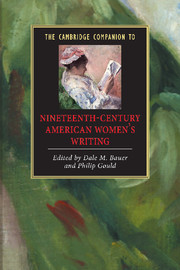Book contents
- Frontmatter
- Introduction
- Part I Historical and theoretical background
- Part 2 Genre, tradition, and innovation
- Part 3 Case studies
- 9 The uses of writing in Margaret Bayard Smith's new nation
- 10 The sentimental novel
- 11 African-American women's spiritual narratives
- 12 The postbellum reform writings of Rebecca Harding Davis and Elizabeth Stuart Phelps
- 13 "Strenuous Artistry": Elizabeth Stoddard’s The Morgesons
- 14 Minnie's Sacrifice: Frances Ellen Watkins Harper’s narrative of citizenship
- Conclusion
- Index
9 - The uses of writing in Margaret Bayard Smith's new nation
from Part 3 - Case studies
Published online by Cambridge University Press: 28 May 2006
- Frontmatter
- Introduction
- Part I Historical and theoretical background
- Part 2 Genre, tradition, and innovation
- Part 3 Case studies
- 9 The uses of writing in Margaret Bayard Smith's new nation
- 10 The sentimental novel
- 11 African-American women's spiritual narratives
- 12 The postbellum reform writings of Rebecca Harding Davis and Elizabeth Stuart Phelps
- 13 "Strenuous Artistry": Elizabeth Stoddard’s The Morgesons
- 14 Minnie's Sacrifice: Frances Ellen Watkins Harper’s narrative of citizenship
- Conclusion
- Index
Summary
When Margaret Bayard Smith wrote the words “let this book speak for me,” she offered a potent proposition (October 1, 1804, diary). With this declaration, she claimed meaning for her writing and significance for herself. Implicitly, she was asking, not asserting, and she was proposing that “this book” was to say what she felt she could not speak. The proposition was fraught with the complications of the post-Revolutionary era in which she lived and of her ambitions, which the age inspired. She employed different writing formats, diaries, letters, publications, to voice her intellect and feelings, as she sought to authenticate her experience to herself, to her children, and to others. Her claim was ultimately historical, for she meant, like others of her generation, to convey her life and her vision of American society to posterity. At her most ambitious, the “me” spoke for the nation (Baym, American Women Writers, 1-9, 11-45, 92-103, 214-39; Ziff, Writing in the New Nation, 28-9, 144-5; Gould, Covenant and Republic, 14-16, 61- 132). She offered in her writings an expansive definition of what it was to be an American. And in her silences can be found the silences in America's history.
Margaret Bayard Smith’s life spanned the transformative period of the new nation. Born during the Revolution (1778) outside of Philadelphia, she died in Washington, DC, in 1844. Her father was Colonel Jonathan Bayard, a prominent merchant, Patriot, legislator, and jurist in Pennsylvania and New Jersey; she grew up in the midst of a well-connected network of mercantile and landed elite families of the mid-Atlantic region.
- Type
- Chapter
- Information
- Publisher: Cambridge University PressPrint publication year: 2001
- 1
- Cited by



